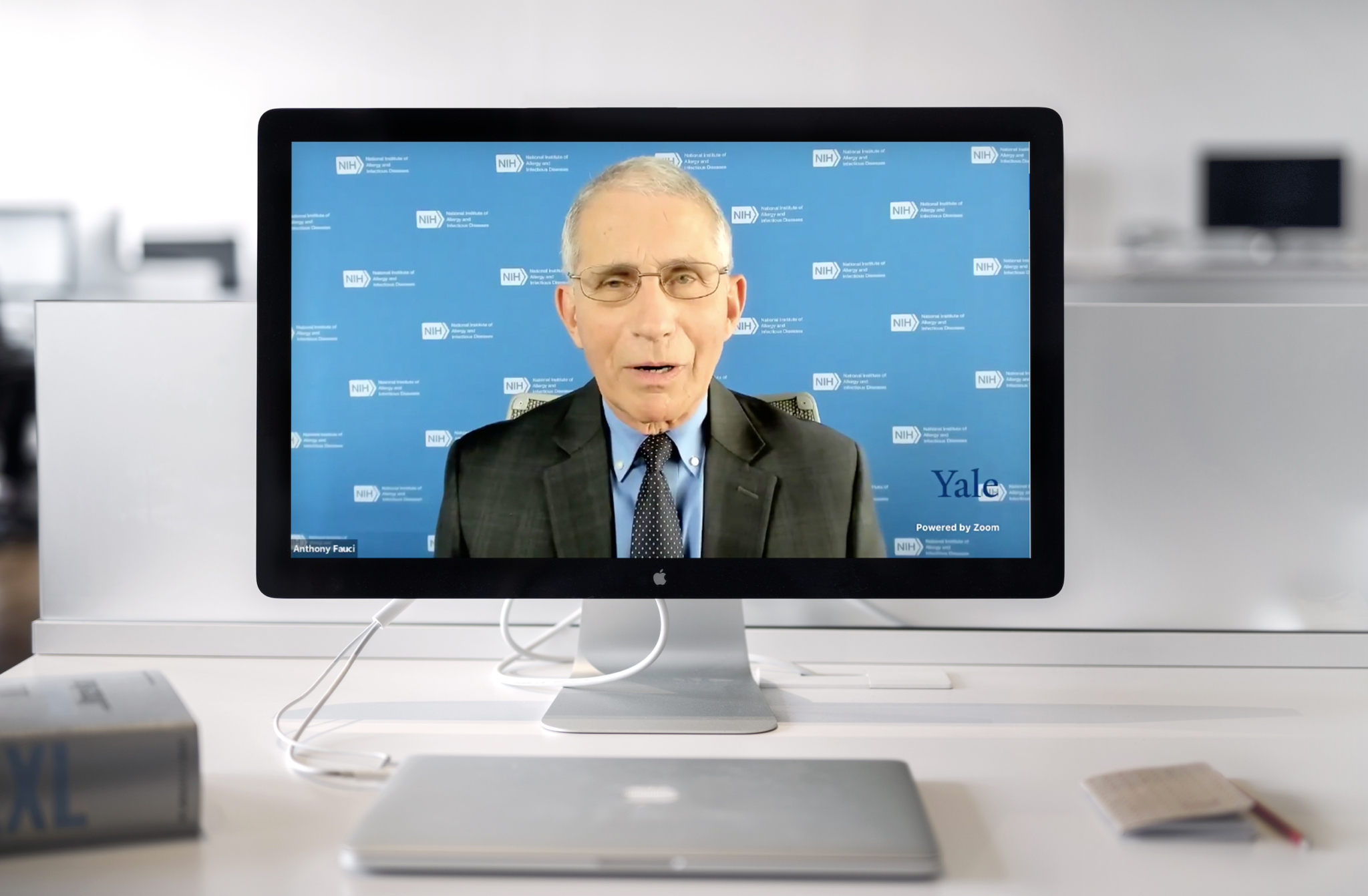
Veronica Lee, Contributing Photographer
On Oct. 26, the Yale Institute for Global Health hosted an online event with Anthony Fauci, the director of the National Institute of Allergy and Infectious Diseases, as part of its Global Health Conversation Series.
The virtual talk was moderated by Robert Bazell, professor of Molecular Cellular and Developmental Biology, and Saad Omer, the Director of the Yale Institute for Global Health. Although it was intended to be a Zoom call open to the public, the event organizers had to move some of the viewers to a Facebook live event, due to the high number of registrations. During the talk, Fauci addressed the ongoing pandemic, the possibility of an upcoming vaccine and how society may recover from the era of COVID-19.
“We’re unfortunately in a very difficult situation right now in the United States,” he said. “Much to our dismay, with the colder weather coming, we’re seeing the highest per day number of cases that we’ve seen in the entire outbreak.”
However, Fauci also noted that the search for a COVID-19 vaccine appears to be promising. He said that among six early animal and human trials for vaccine candidates that are supported by the U.S. government, five of which are already in phase III trials and all of which have encouraging data thus far. As a result, he predicts that the public will know if any of the candidates are completely safe and effective by the beginning of December.
Fauci emphasized that the success of any vaccine will depend on its efficacy, durability and uptake — the amount of people in which the vaccine can actually be administered. According to him, expecting a vaccine with even 70 to 80 percent effectiveness is optimistic, and it is also possible that an additional booster dose will have to be administered following the initial vaccination.
Another critical requirement for the success of a future vaccine in halting the spread of the coronavirus is a country’s ability to roll it out to as many people as possible in a cost-efficient and safe manner, Fauci explained. If all goes to plan, he says, the public may begin to approach herd immunity — another hotly debated topic regarding the coronavirus. This phenomenon occurs when a large enough part of a given population becomes immune to a disease thus reducing the overall risk of transmission, according to the Mayo Clinic.
“We simply cannot rely on infection alone to achieve herd immunity,” Fauci said. “The disease and death burden in that situation are completely unacceptable. Rather, we have to get a modestly effective vaccine with wide uptake to move forward.”
Another major issue that Fauci addressed was the significant portion of the country that continues to distrust and deny science — vaccines in particular.
Mistrust of all vaccines more generally has been on the rise in the U.S. in recent years, and has only become more pronounced during the recent pandemic. Even if a COVID-19 vaccine were to be made available to the public, it may be a struggle to convince certain groups to get it.
Fauci said that although this mistrust is “extremely disturbing,” one must address it, rather than ignore it. He stressed the importance of engaging with those who do not plan to take the vaccine in order to establish common ground and an open line of communication.
“We can’t be condescending towards people,” Bazell told the News. “It is our responsibility to have healthy dialogue with communities who have real concerns and fears.”
Both Fauci and Omer said there is no doubt that the COVID-19 pandemic has changed the landscape of disease prevention and therapeutics. Upon witnessing the extensive and rapid destruction caused by this virus, researchers have poured their efforts into developing more efficient technologies, resulting in numerous scientific advances.
Fauci noted that these experts mobilized almost overnight to combat the pandemic when it started. Many of their labs were not even focused on epidemiological or immunological research, but still dedicated their resources to fighting the virus.
“Even without knowing what the next disease will be, we have invested in platforms to speed up the process for creating vaccines and therapeutics in the future,” Omer told the News. “This did not exist a few decades ago, and it will undoubtedly be useful long after the coronavirus pandemic is over.”
In an interview with the News, Omer praised Fauci and his work during the pandemic. Referring to him as a “compassionate scientist,” he said that throughout his career, Fauci has kept an open mind when it comes to criticism of his own work. According to Omer, Fauci has never been afraid to change his scientific opinion based on new information, especially in the case of the COVID-19 pandemic’s progression.
Ending the talk on an optimistic note, Fauci expressed the historical significance of the pandemic and provided reassurance during a time of uncertainty.
“This will not last forever,” he said. “There is an end in sight, and people will start to see the sun coming up a little in the future.”
Between Oct. 22 and Oct. 29, there have been 521,726 new COVID-19 cases in the United States, according to the Centers for Disease Control and Prevention.
Veronica Lee | veronica.lee@yale.edu







